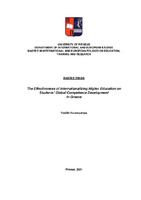The effectiveness of internationalizing higher education on students’ global competence development in Greece

Master Thesis
Συγγραφέας
Καράμπαμπα, Βασιλική
Karampampa, Vasiliki
Ημερομηνία
2021-05-29Επιβλέπων
Ασδεράκη, ΦωτεινήAsderaki, Foteini
Προβολή/
Λέξεις κλειδιά
Global competence ; Higher education ; Internationalization of the curriculum ; Internationalization of higher education ; PISA OECD frameworkΠερίληψη
Η διεθνοποίηση αποτελεί ένα από τα χαρακτηριστικά των σύγχρονων εκπαιδευτικών πολιτικών για την Ανώτατη Εκπαίδευση (ΑΕ) σε εθνικό, ευρωπαϊκό και παγκόσμιο επίπεδο. Στην Ελλάδα, εντοπίζονται αρκετές πρακτικές και προσεγγίσεις με χαρακτήρα διεθνοποίησης που εφαρμόζονται στα Ανώτατα Εκπαιδευτικά Ιδρύματα (ΑΕΙ). Οι πρακτικές δύνανται να επηρεάσουν με θετικό τρόπο την ανάπτυξη της «παγκόσμιας ικανότητας» των φοιτητών και αποφοίτων εξοπλίζοντάς τους με τις δεξιότητες εκείνες που απαιτούνται σε μεγάλο βαθμό από την κοινωνία της γνώσης του 21ου αι., την παγκοσμιοποιημένη αγορά εργασίας, καθώς και τις πολυπολιτισμικές κοινωνίες. Ο ΟΟΣΑ στα πλαίσια του PISA δημιούργησε το «Πλαίσιο για την Παγκόσμια Ικανότητα» προκειμένου να αξιολογήσει την παγκόσμια δεξιότητα. Ο στόχος της παρούσης διπλωματικής εργασίας ήταν να εξεταστούν τα αποτελέσματα των προγραμμάτων διεθνοποίησης στην ανάπτυξης συγκεκριμένων χαρακτηριστικών (δεξιότητες, γνώσεις, στάσεις, που περιλαμβάνονται στο Πλαίσιο PISA) της παγκόσμιας ικανότητας φοιτητών και αποφοίτων Ανώτατων Εκπαιδευτικών Ιδρυμάτων στην Ελλάδα. Συνολικά αναλύθηκαν τετρακόσια τριάντα πέντε ερωτηματολόγια, αφού συμπληρώθηκαν από ενεργούς φοιτητές ή πρόσφατους αποφοίτους στην Ελλάδα. Τα ευρήματα της έρευνας πεδίου μας οδήγησαν σε σημαντικά αποτελέσματα και συμπεράσματα σχετικά με τον αντίκτυπο των προγραμμάτων αυτών στην διαμόρφωση πολιτών με «παγκόσμιες δεξιότητες». Συγκεκριμένα, ανακαλύψαμε ότι οι πρακτικές διεθνοποίησης των ΑΕΙ (τόσο στο εξωτερικό όσο και στο εσωτερικό) έχουν οδηγήσει σε αύξηση των παγκόσμιων δεξιοτήτων των μαθητών, όπως η προσαρμοστικότητα, η ευαισθητοποίηση για διαπολιτισμική επικοινωνία, το ενδιαφέρον για διεθνή θέματα, η νοοτροπία του πολίτη του κόσμου, η ευαισθητοποίηση σχετικά με την προστασία του περιβάλλοντος, και η ευαισθητοποίηση σχετικά με την ισότητα των φύλων. Όλες αυτές οι δεξιότητες που αξιολογούνται από το νέο εργαλείο μέτρησης του ΟΟΣΑ είναι επίσης σύμφωνες με τους Στόχους Βιώσιμης Ανάπτυξης και την Ατζέντα του ΟΗΕ για το 2030. Τέλος, τα ευρήματα κατέδειξαν τη σχέση μεταξύ της παγκόσμιας ικανότητας και της διεθνοποίησης της ΑΕ, τονίζοντας τη σημασία της ενσωμάτωσης διεθνών και παγκόσμιων διαστάσεων στα προγράμματα σπουδών των ΑΕΙ.


